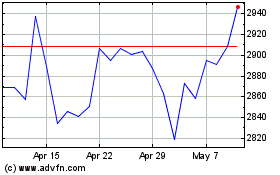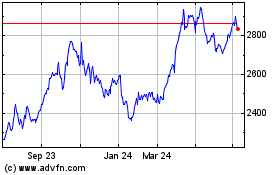Shell Oil Spills Led to 'Astonishingly High' Pollution in Nigeria
March 23 2017 - 3:27PM
Dow Jones News
By Sarah Kent
Royal Dutch Shell PLC oil spills that haven't been cleaned up
for over eight years have contributed to "astonishingly high"
levels of pollution in a Nigerian community, according to a
consultant who helped produce a confidential damage assessment for
Shell and its partners in the cleanup.
Shell admitted liability for two large oil spills from a broken
pipeline in 2008 in Bodo, a Niger Delta fishing community that,
according to U.K. court claims, was inundated with over 500,000
barrels of oil -- roughly twice the amount when the Exxon Valdez
ran aground in Alaska in 1989. Shell disputed the volume of the
spills but reached an out-of-court settlement with the community
for GBP55 million in 2015 -- or around $80 million at the time --
after facing a lawsuit in London.
An environmental damage study was also conducted that year as
part of efforts to clean up the area under the Bodo Mediation
Initiative, which included Shell's Nigerian subsidiary, civil
society groups, and members of the local community and
government.
The study found that "astonishingly high" levels of pollution
remained in Bodo's mangroves and creeks years after the spill,
endangering the community, wrote Kay Holtzmann, the former director
of the cleanup project, in a Jan. 26 letter to the Bodo Mediation
Initiative, which was seen by The Wall Street Journal.
"The soil in the mangroves is literally soaked with
hydrocarbons," wrote Mr. Holtzmann, who oversaw the study but no
longer works for the initiative. "Whoever is walking in the creeks
cannot avoid contact with toxic substances."
Mr. Holtzmann wrote that the study dictated a need for health
screenings and should be widely publicized. He wrote that Shell has
denied him permission to publish the study's results in a
scientific journal and exposed Bodo, an expanse of Niger Delta
swamp and mangroves, to dangerous levels of toxins.
"SPDC has no right to conceal data important for the public
although they might be unpleasant," the letter said, referring to
Shell Petroleum Development Co. of Nigeria, the Anglo-Dutch
company's Nigerian subsidiary.
Shell said the analysis didn't reveal any information that
hadn't been previously established by a United Nations Environment
Program report on pollution levels in Ogoniland, the part of the
Niger Delta where Bodo is located.
The 2011 report revealed high levels of contamination that could
take as long as 30 years to fully clean up. In an interview, UNEP's
executive director Erik Solheim described the current situation in
Ogoniland as "one of the biggest environmental scandals and
catastrophes anywhere in the world."
According to people familiar with the matter, complex disputes
between the company and the local community have stalled cleanup
efforts in Bodo and attempts to communicate findings from the
assessment, though they were shared with local representatives and
government agencies. The environmental damage caused by the 2008
spills has also been compounded by illegal refining in the area,
the people said.
The oil-rich Niger Delta has been a center for Shell's oil
production for decades, but aging infrastructure and widespread
sabotage and theft have resulted in regular oil spills that ravaged
the local environment. Shell maintains that the bulk of the oil
spills in the Niger Delta are caused by sabotage, theft and illegal
refining.
Efforts to improve the situation in Bodo have been plagued by
mistrust, local power struggles, and disputes over how money for
the work would be distributed, according to Inemo Samiama, chairman
of the Bodo Mediation Initiative. In late 2015, the camp where
cleanup contractors were staying was attacked, effectively halting
work until now, the people said.
In response to the concerns raised in Mr. Holtzmann's letter,
Mr. Samiama said: "The number one solution to dealing with the
health consequences is to start the cleanup."
Leigh Day, the law firm that represented the Bodo community,
wrote to Shell in January to request clarification after receiving
a copy of Mr. Holtzmann's letter. The law firm said it had yet to
receive a response.
"We're extremely concerned," said Daniel Leader, a partner at
Leigh Day who worked on the Bodo case. "We have been asking for
health testing and to check the water supply for many years and
they have simply not done it."
Write to Sarah Kent at sarah.kent@wsj.com
(END) Dow Jones Newswires
March 23, 2017 15:12 ET (19:12 GMT)
Copyright (c) 2017 Dow Jones & Company, Inc.
Shell (LSE:SHEL)
Historical Stock Chart
From Mar 2024 to Apr 2024

Shell (LSE:SHEL)
Historical Stock Chart
From Apr 2023 to Apr 2024
